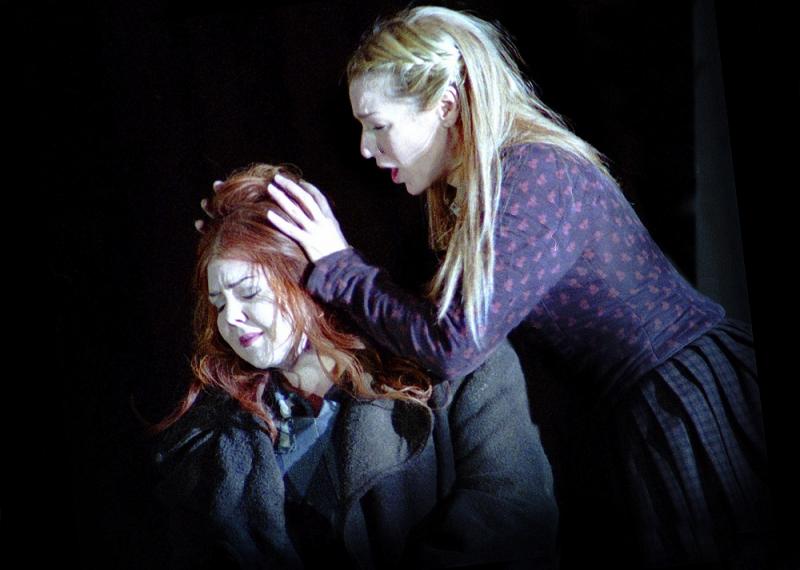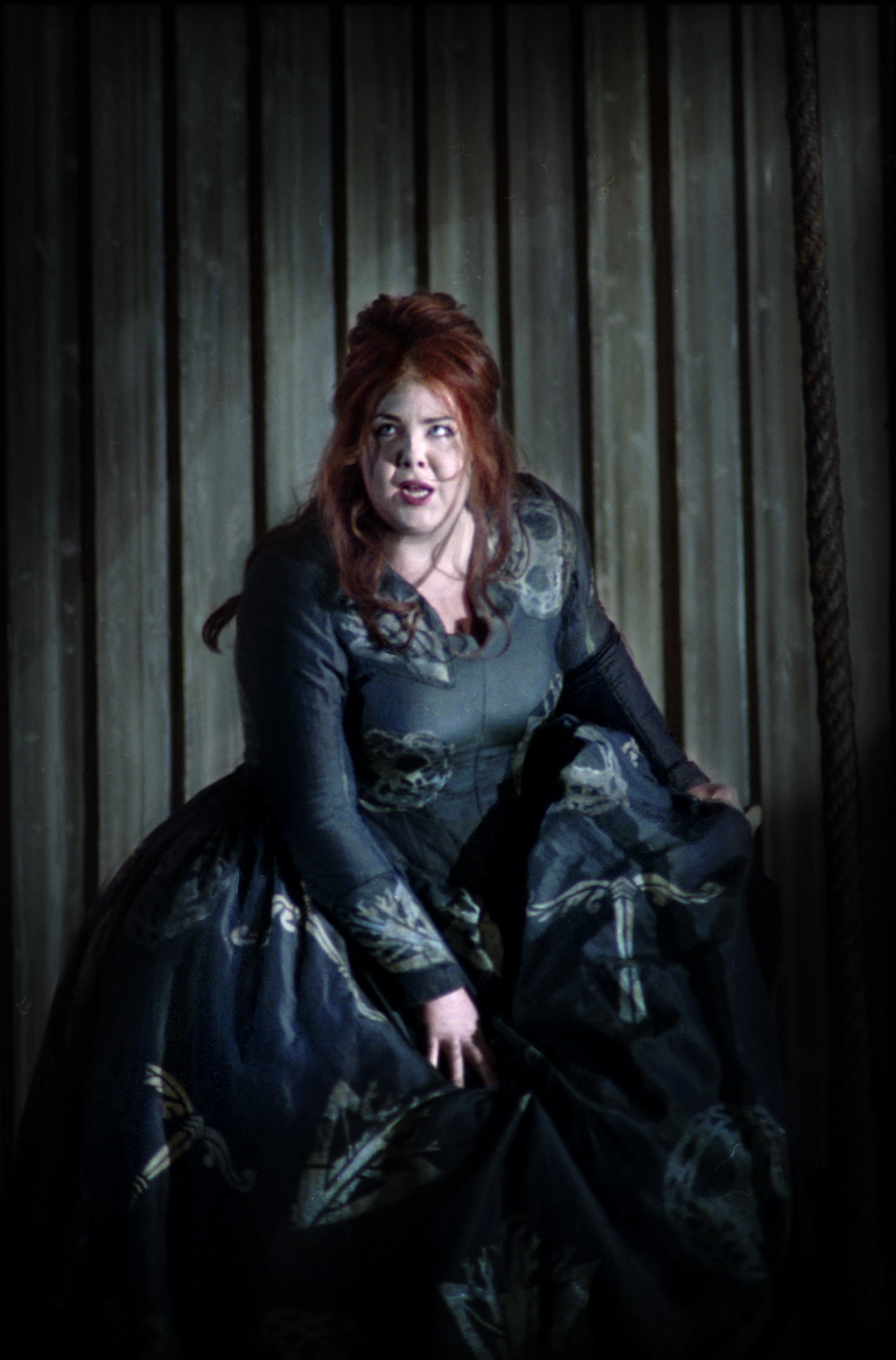Norma, English National Opera | reviews, news & interviews
Norma, English National Opera
Norma, English National Opera
Classy sister act soars above Bellini's dull bits and an overcooked production

In the light of what follows, it's probably best to be clear that I'm completely behind the artistic side of ENO in rejecting a 25 per cent reduction of the chorus's annual salary, tied to a shorter season. A full-time chorus of this size is the heart of a big company – without it, no Mastersingers, no Grimes, no Lady Macbeth of Mtsensk.
There has to be one very strong reason for ENO putting on not terribly music-theatre-friendly hokum like the early-19th-century Italian bel canto operas sung in English: namely a soprano who can hold her own against the pricier stars available to the Royal Opera. The company's Lucia di Lammermoor painfully lacked a beating heart in Anna Christy's doll-like heroine. Now, though, the track record for engaging strong American singers which began this season with Patricia Racette's Katerina Izmailova and continued with Tamara Wilson's revelation of a Leonora in The Force of Destiny is crowned by Marjorie Owens as Bellini's Druid priestess who's broken her vestal vows (pictured below). In a double coup, her unwitting love-rival Adalgisa is every inch Owens's equal in the astonishing performance of mezzo Jennifer Holloway. The duets between these two ladies make or break any Norma and have a dramatic backbone that's otherwise lacking in Bellini's hit-or-miss opera by numbers: there's the tension that for a while they don't know they're backing the same shit as a lover, ignoble Roman Pollione, that Norma needs to reveal the two children by Pollione whom she's miraculously been able to conceal from the cult and that Adalgisa needs to convince Norma of her sisterly devotion. The second, and greatest, duet in Act II is also one of the few stretches where director Christopher Alden, in a production first seen at Opera North in 2012 (so ENO were warned), doesn't break focus with someone else flumping or crashing across the stage doing something inappropriate or unintelligible.
The duets between these two ladies make or break any Norma and have a dramatic backbone that's otherwise lacking in Bellini's hit-or-miss opera by numbers: there's the tension that for a while they don't know they're backing the same shit as a lover, ignoble Roman Pollione, that Norma needs to reveal the two children by Pollione whom she's miraculously been able to conceal from the cult and that Adalgisa needs to convince Norma of her sisterly devotion. The second, and greatest, duet in Act II is also one of the few stretches where director Christopher Alden, in a production first seen at Opera North in 2012 (so ENO were warned), doesn't break focus with someone else flumping or crashing across the stage doing something inappropriate or unintelligible.
In that respect you have to pity Valerie Reid as Norma's confidante and child-help Clotilde, at one stage staggering around with a sickle like a cartoon harpy of the French Revolution – the period in fact is mid-Victorian, ask not why – and Adrian Dwyer as Flavio, Pollione's similarly top-hatted sidekick, an arrogant over-present henchman doomed by Alden to a nasty but still rather risible end.
Chief "druid" Oroveso for some reason manipulates the action for as long as he can, and has to hang around on stage way too often, but at least this gives the opportunity to James Cresswell (pictured below with Owens), more or less the resident company bass this season, to let rip with the magnificent timbre which he's been reining in as a believable (if also cultish) Sarastro. There's also much stumbling and fruitless aggression demanded from the chorus, who – it should go without saying these days, though the management is deaf to the fact – provide their usual irreplaceable company spirit in singing some rather dull numbers extremely well. Alden was right to bring them forward for a special second bow at the curtain call, but the roars which greeted their first had already spoken volumes.
Set Bellini's fitful drama when and where you please, but give us a moon and a sacred wood, not just wood – the setting seems to be a large rural barn with dangerous farming implements hanging on one wall and a smithy below them– and daylight coming through two high, small windows. You know from the start you're not going to be rid of Charles Edwards's one-size-fits-all design – not a patch on his Royal Opera Elektra – or that giant phallic log with which only Holloway's Adalgisa has any meaningful relationship. Peter Auty, a clarion tenor from the start in a thankless role, has to straddle it (why?) and Owens needs to climb it to sit vatically on a precarious chair for what will forever be "Casta diva", her rather splendid Victorian dress covered with cult symbols billowing (rather handsome work there, all the same, from costume designer Sue Wilmington).
Owens's first offstage recitative proclaimed a vibrato that could be worrying for the long bel canto lines, and some odd vowel modifications in the upper register for George Hall's well-fitting translation, but reservations dissolved within minutes of the great hymn to the moon. You know whether you're in safe hands or not when the climactic phrase rises to a top B and the soprano has to cling on to it, ff, before hitting the C and descending; not to lose pitch at this point shows a secure technique, and Owens has that in spades. She combines the near-impossible in the role – declamation fit for a Brünnhilde or Isolde and coloratura precision.

You don't expect limpidity in this space, and neither Owens nor Holloway, when combining in liquid thirds, offer much of that, but their voices are a perfect match for each other, and without an equally strong Adalgisa the show is lost. Holloway, in other words, is its crucial lynchpin and saviour. Stephen Lord's conducting, riveting the attention and drawing unexpected colours from the ENO Orchestra in a prelude which we hardly notice isn't great music, supports and moves with his singers well enough, though lacking the last degree of Italianate rubato and natural gear shifts.
At the end of the first act, Alden has his Norma sit there with an axe, as if we're going to move on to Strauss's Elektra after the interval. Of course it's shades of another Greek heroine, Medea, whom Bellini and his librettist Romani invoke as the wronged secret wife thinks of avenging herself on her man by slaughtering their children. She doesn't – no plot spoiler there – and she wastes the strong feminist stance of Adalgisa in rejecting the cad by wanting to return to him.
Well, that's Italian opera; but if dramatic and musical truth flourish only fitfully in Bellini's best operatic shot, we've had our vision from the two great scenes of female sorority. And yes, ENO chose well in its voices yet again. Usually a poor production would knock a star or two off the singing, but in Bellini acting with the voice absolutely has to come first, and here it does. Now hurry up and sign the petition from 'the Spirit of Lilian Baylis' if you haven't already done so. This kind of collective energy can't be squandered; once it's diminished, it's lost for ever.
rating
Explore topics
Share this article
The future of Arts Journalism
You can stop theartsdesk.com closing!
We urgently need financing to survive. Our fundraising drive has thus far raised £49,000 but we need to reach £100,000 or we will be forced to close. Please contribute here: https://gofund.me/c3f6033d
And if you can forward this information to anyone who might assist, we’d be grateful.

Subscribe to theartsdesk.com
Thank you for continuing to read our work on theartsdesk.com. For unlimited access to every article in its entirety, including our archive of more than 15,000 pieces, we're asking for £5 per month or £40 per year. We feel it's a very good deal, and hope you do too.
To take a subscription now simply click here.
And if you're looking for that extra gift for a friend or family member, why not treat them to a theartsdesk.com gift subscription?
more Opera
 La bohème, Opera North review - still young at 32
Love and separation, ecstasy and heartbreak, in masterfully updated Puccini
La bohème, Opera North review - still young at 32
Love and separation, ecstasy and heartbreak, in masterfully updated Puccini
 Albert Herring, English National Opera review - a great comedy with depths fully realised
Britten’s delight was never made for the Coliseum, but it works on its first outing there
Albert Herring, English National Opera review - a great comedy with depths fully realised
Britten’s delight was never made for the Coliseum, but it works on its first outing there
 Carmen, English National Opera review - not quite dangerous
Hopes for Niamh O’Sullivan only partly fulfilled, though much good singing throughout
Carmen, English National Opera review - not quite dangerous
Hopes for Niamh O’Sullivan only partly fulfilled, though much good singing throughout
 Giustino, Linbury Theatre review - a stylish account of a slight opera
Gods, mortals and monsters do battle in Handel's charming drama
Giustino, Linbury Theatre review - a stylish account of a slight opera
Gods, mortals and monsters do battle in Handel's charming drama
 Susanna, Opera North review - hybrid staging of a Handel oratorio
Dance and signing complement outstanding singing in a story of virtue rewarded
Susanna, Opera North review - hybrid staging of a Handel oratorio
Dance and signing complement outstanding singing in a story of virtue rewarded
 Ariodante, Opéra Garnier, Paris review - a blast of Baroque beauty
A near-perfect night at the opera
Ariodante, Opéra Garnier, Paris review - a blast of Baroque beauty
A near-perfect night at the opera
 Cinderella/La Cenerentola, English National Opera review - the truth behind the tinsel
Appealing performances cut through hyperactive stagecraft
Cinderella/La Cenerentola, English National Opera review - the truth behind the tinsel
Appealing performances cut through hyperactive stagecraft
 Tosca, Royal Opera review - Ailyn Pérez steps in as the most vivid of divas
Jakub Hrůša’s multicoloured Puccini last night found a soprano to match
Tosca, Royal Opera review - Ailyn Pérez steps in as the most vivid of divas
Jakub Hrůša’s multicoloured Puccini last night found a soprano to match
 Tosca, Welsh National Opera review - a great company reduced to brilliance
The old warhorse made special by the basics
Tosca, Welsh National Opera review - a great company reduced to brilliance
The old warhorse made special by the basics
 BBC Proms: The Marriage of Figaro, Glyndebourne Festival review - merriment and menace
Strong Proms transfer for a robust and affecting show
BBC Proms: The Marriage of Figaro, Glyndebourne Festival review - merriment and menace
Strong Proms transfer for a robust and affecting show
 BBC Proms: Suor Angelica, LSO, Pappano review - earthly passion, heavenly grief
A Sister to remember blesses Puccini's convent tragedy
BBC Proms: Suor Angelica, LSO, Pappano review - earthly passion, heavenly grief
A Sister to remember blesses Puccini's convent tragedy
 Orpheus and Eurydice, Opera Queensland/SCO, Edinburgh International Festival 2025 review - dazzling, but distracting
Eye-popping acrobatics don’t always assist in Gluck’s quest for operatic truth
Orpheus and Eurydice, Opera Queensland/SCO, Edinburgh International Festival 2025 review - dazzling, but distracting
Eye-popping acrobatics don’t always assist in Gluck’s quest for operatic truth

Add comment